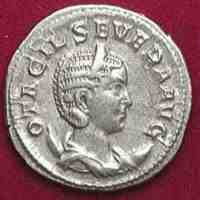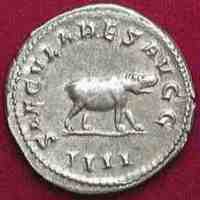
Otacilia Severa, wife of Emperor Philip I,
"the Arab." Coin dated 247/248 AD
image courtesy of Edgar L. Owen,

games for Rome's 1000th birthday and the
new Saeculum,about 110 years in length
image courtesy of Edgar L. Owen,
 Otacilia Severa, wife of Emperor Philip I, "the Arab." Coin dated 247/248 AD image courtesy of Edgar L. Owen, |
Latin
204
Spring
2009
|
 games for Rome's 1000th birthday and the new Saeculum,about 110 years in length image courtesy of Edgar L. Owen, |
Instructor:
Dr. Victor A. Leuci
Newnham Hall 37
592-5324
Home (573) 815-9333 (not after 10:00 pm)
e-mail: victor.leuci@westminster-mo.edu
Web site: www.westminster-mo.edu/wc_users/homepages/faculty/leuciv/index.html
Office Hours: MW 1:15 -- 2:45 pm from January 14 to April 29, and by appointment
Link to bio
Texts:
Objectives: This course is an introduction to Latin poetry and its conventions with special emphasis on the poems of Ovid. In addition to the translation and analysis of Latin poetry, you will be responsible for reading and discussing a representative selection of modern criticism on the poetry and/or its cultural context.P. Green, transl, The Erotic Poems. Penguin 1983 A. D. Melville, transl., Metamorphoses. Oxford Univ Pr. 1998 B. R. Nagle transl.,Ovid's Fasti : Roman Holidays. Indiana Univ Pr. 1995 C. A. Jestin and P. Katz, Ovid: Amores, Metamorphoses, Selections. Bolchazy-Carducci 1998 D. Davis-Henry and C. Perkins, Ovid LEGAMUS: Transitional Reader. Bolchazy-Carducci. 2008
Format of Course: Attendance and participation in class are essential for the success of the course. More than 2 unexcused absences will be considered excessive, and make-up work will be accepted only for excused absences. In class we will translate and analyze poems or sections of longer poems. An oral version of the critical summaries and translation/essay projects will be presented in class. Critical essays and sections of relevant books will be assigned during the course of the semester.
Grading: There will be on average a quiz every week or so (25 pts each). Homework and class participation will count the equivalent of two quizzes (50 pts). There will be 2-3 critical reviews and 1 critical edition (25 pts each). There will be 2-3 exams--1-2 during the semester and 1 during finals week (75 pts each). You may drop your lowest quiz score and your lowest exam score.
Honor Code: All students and faculty must adhere to the Honor Code; please see the Student Life Handbook for the full description of the Honor Code--p. 21 in the Student Life Handbook gives a short definition: "No Westminster student shall commit any act of academic dishonesty in order to advance her or his own academic performance, or to impede or advance the academic progress of others," but the sections on plagiarism and cheating are especially important (see Honor Commission Constitution, Article IX).
ADA Accommodation: Any student who feels that he or she may need an accommodation based on the impact of a disability should contact me to arrange an appointment as soon as possible. At that time, we can discuss the course format, anticipate your needs, and explore possible accommodations. Westminster's ADA policy can be found at the College's website (click here)
Attendance:Regular attendance and participation are essential for the success of the class. More than 2 unexcused absences will be considered excessive, and no make-up work will be accepted for all unexcused absences. Each unexcused absence past 2 will result in a 6 point deduction from your overall grade.
Assignments:Below links to the projected assignments for the semester. The assignments, however, will be adjusted to needs of the class, and we will not rush ahead simply to stay in line with the syllabus. I will announce well in advance any changes in the assignments as they become necessary.
|
Jan 14-16
|
W-F | Introduction to Ovid |
|
20-22
|
Tu-Th | Ovid's Fasti (Introduction & up to Jan 17 |
|
26-30
|
M-F | Legamus, pp 1-8; Fasti (rest of January) |
|
Feb 2-6
|
M-F | Latin: Legamus; English: Metamorphoses, Bk 1-2; Fasti;
Quiz |
|
9-13
|
M-F | Metamorphoses; Quiz |
|
16-20
|
M-F | Metamorphoses Quiz |
|
23-27
|
M-F | Metamorphoses;
Exam 1 |
|
Mar 2-6
|
M-F | Metamorphoses: Quiz |
|
9-13
|
M-F | Metamorphoses Quiz |
|
16-20
|
M-F | Metamorphoses: Quiz |
|
20-24
|
M-F | Amores:
Exam 2 |
|
30-Apr 3
|
M-F | No Class: Spring Break |
|
6-10
|
M-F | Amores: Quiz |
|
13-17
|
M-F | Amores: Quiz |
|
20-24
|
M-F | Amores: Quiz |
| 27-30 | M-Th | Amores: Quiz |
| May | Final |